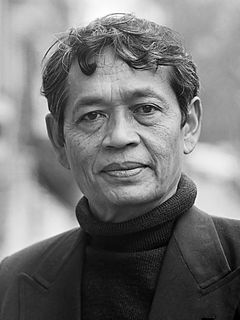
Mochtar Lubis was an Indonesian Batak journalist and novelist who co-founded Indonesia Raya and monthly literary magazine "Horison". His novel Senja di Jakarta was the first Indonesian novel to be translated into English. He was a critic of Sukarno and was imprisoned by him.

Pertemuan Jodoh is an Indonesian novel by Abdul Muis originally published in 1932. It tells the story of two students who are driven apart by their class differences, but eventually marry.
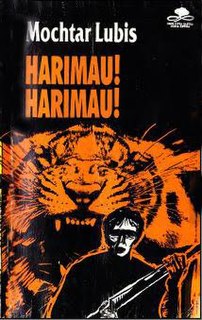
Harimau! Harimau! is an Indonesian novel written by Mochtar Lubis and originally published in 1975. Written in a Madiun prison as a response to Indonesians following President Sukarno's leadership without question, it tells the story of seven dammar collectors who are attacked by a tiger on their way back to their village and are unable to be saved by their charismatic leader. The book was critically acclaimed, receiving the Best Book award from the Indonesian Department of Education and Culture. It has been translated into English, Dutch and Mandarin.

Jalan Tak Ada Ujung is an Indonesian novel by Mochtar Lubis first published by Balai Pustaka in 1952. It takes place during the Indonesian war of independence and tells the story of Guru Isa, a schoolteacher who assists the guerrilla freedom fighters yet lives in fear.
Azab dan Sengsara is a 1920 novel written by Merari Siregar and published by Balai Pustaka, Indonesia's major publisher at that time. It tells the story of two lovers, Amiruddin and Mariamin, who are unable to marry and eventually become miserable. It is generally considered the first modern Indonesian novel.
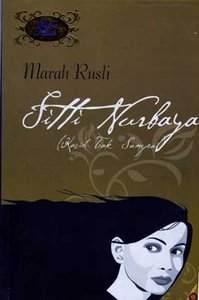
Sitti Nurbaya: Kasih Tak Sampai is an Indonesian novel by Marah Rusli. It was published by Balai Pustaka, the state-owned publisher and literary bureau of the Dutch East Indies, in 1922. The author was influenced by the cultures of the west Sumatran Minangkabau and the Dutch colonials, who had controlled Indonesia in various forms since the 17th century. Another influence may have been a negative experience within the author's family; after he had chosen a Sundanese woman to be his wife, Rusli's family brought him back to Padang and forced him to marry a Minangkabau woman chosen for him.
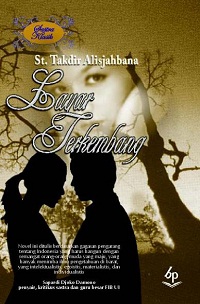
Layar Terkembang is an Indonesian novel by Sutan Takdir Alisjahbana. Published in 1936 or 1937 by Balai Pustaka, it tells the story of two sisters and their relationship with a medical student. It has been noted as emphasizing the need for Indonesians to adopt Western values in order to modernize the country.

Belenggoe is a novel by Indonesian author Armijn Pane. The novel follows the love triangle between a doctor, his wife, and his childhood friend, which eventually causes each of the three characters to lose the ones they love. Originally published by the literary magazine Poedjangga Baroe in three instalments from April to June 1940, it was the magazine's only published novel. It was also the first Indonesian psychological novel.

Atheis is a 1949 Indonesian novel written by Achdiat Karta Mihardja and published by Balai Pustaka. The novel, using three narrative voices, details the rise and fall of Hasan, a young Muslim who is raised to be religious but winds up doubting his faith after dealings with his Marxist–Leninist childhood friend and an anarcho-nihilist writer.
Darah Muda is a 1927 novel written by Indonesian writer Djamaluddin Adinegoro and published by Balai Pustaka. It is one of few Indonesian novels from the period in which the protagonists succeed in love.

Dian jang Ta' Koendjoeng Padam is a 1932 novel by Sutan Takdir Alisjahbana. It was published by Balai Pustaka.
Asmara Djaja is a 1928 novel written by Indonesian writer Djamaluddin Adinegoro and published by Balai Pustaka. It is one of few Indonesian novels from the period in which the protagonists succeed in love.
"Soerabaja" is a work of fiction by Indonesian writer Idrus variously described as a novel, novelette, and long short story. It was published in 1946 or 1947.
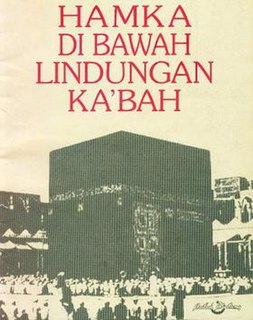
Di Bawah Lindungan Ka'bah is the 1938 debut novel of the Indonesian author Haji Abdul Malik Karim Amrullah (1908–1981). Written while the author worked in Medan as the editor of an Islamic weekly magazine, the novel follows the doomed romance of a young Minang couple from different social backgrounds. Generally praised for its simple yet eloquent diction, the novel has been twice adapted into film, first in 1977 and then in 2011.

Atheis is a 1974 Indonesian film directed by Sjumandjaja and adapted from Achdiat Karta Mihardja's novel of the same name. It follows a young Muslim man named Hasan who, through his interactions with others, loses his faith.
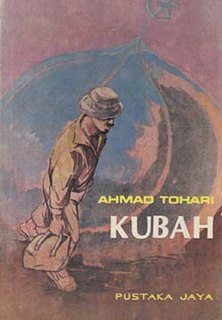
Kubah is an Indonesian novel written by Ahmad Tohari. It follows a poor man named Karman who becomes a member of the Indonesian Communist Party, only to find himself a victim of the ongoing political struggles in 1950s Indonesia. After the Party's destruction he spends twelve years as a prisoner at Buru before returning to his hometown and becoming a devout Muslim.
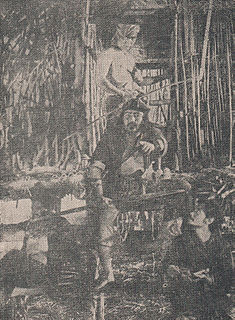
Anak Perawan di Sarang Penjamun is a 1962 Indonesian film directed and produced by Usmar Ismail for PERFINI. Starring Bambang Hermanto and Nurbani Yusuf, it follows a young woman who is kidnapped by a group of bandits, only to fall in love with their leader. The film, adapted from the 1940 novel of the same name by Sutan Takdir Alisjahbana, was repeatedly blacklisted by the Indonesian government and only saw release several years after production ended.
Nico Pelamonia was an Indonesian actor turned film director who won the Citra Award for Best Director in 1976 for his film Semalam di Malaysia. He has been involved in 33 feature film productions since his debut in Fred Young's Dibalik Awan in 1963.
Noesa Penida is a 1941 film from the Dutch East Indies which was directed by Andjar Asmara and produced by The Teng Chun of Java Industrial FIlm. It tells of a love triangle between two brothers, born to a commoner, and a noble woman.
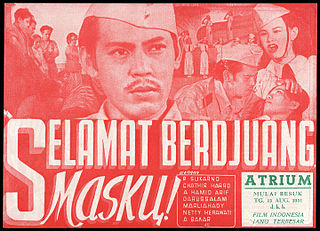
Selamat Berdjuang, Masku! is a 1951 Indonesian film directed by R.H. Andjar Subyanto and starring Raden Sukarno and Marlia Hardi. It follows a former guerrilla leader who must pursue his love despite the interference of his former comrades.














